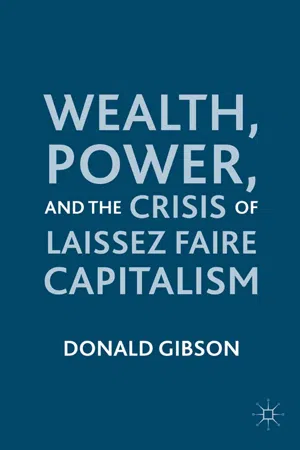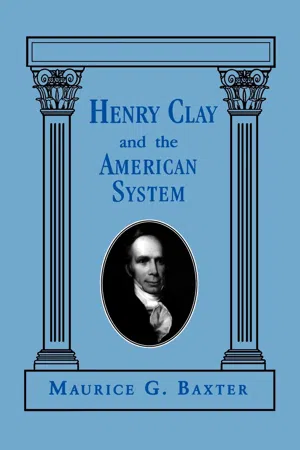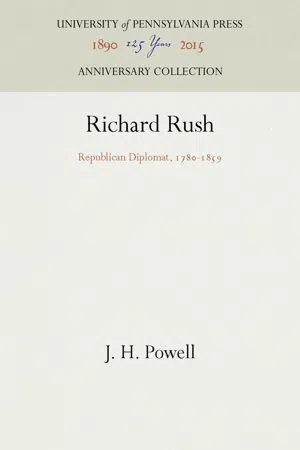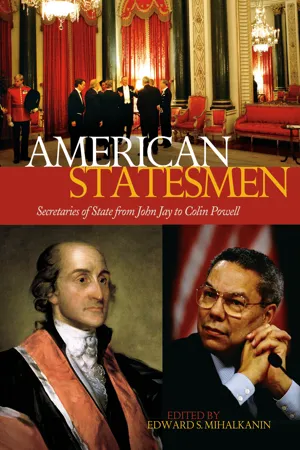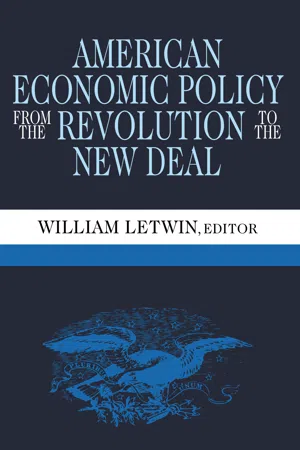History
The American System
The American System was a set of economic policies proposed by Henry Clay in the early 19th century. It aimed to promote economic growth and national unity by creating a protective tariff to support American industry, a national bank to provide credit and regulate currency, and internal improvements such as roads and canals to facilitate transportation and trade.
Written by Perlego with AI-assistance
Related key terms
1 of 5
6 Key excerpts on "The American System"
- D. Gibson(Author)
- 2011(Publication Date)
- Palgrave Macmillan(Publisher)
C H A P T E R T W O American System v. Smith Adam Smith spoke for entrenched interests. His theories provided a ratio- nale and parts of a strategy for maintaining England’s recently developed advantages over other countries in manufacturing and provided a defense of the developing investor class. Smith argued that other countries should trade with England to get manufactured goods and should not undertake policies to promote their own production. Government should not try to direct the behavior of wealth holders. Cain and Hopkins point out that in an English economy still dominated by agriculture at the end of the 1700s, at least 75 percent of all agricultural land “was owned by no more than 4,000–5,000 aristocrats and gentry.” 1 Smith had no apparent problem with this, and his ideas supported freedom of action for these aristocrats and gentry, who also were part of the investor class, as well as for financiers, traders, and manufacturers. At its core this was completely consistent with John Locke’s argument that government and society exist to protect prop- erty and to carry out various military and police functions. The American System school of thought was in opposition to the ideas of Smith and Locke and others of the English “liberal” school such as Thomas Malthus and David Ricardo. Henry Clay introduced the term “American System” in 1824 “to describe his three part program of protective tariffs, internal improvements and a national bank.” 2 As we have seen, the regulation of trade, government invest- ments in transportation, and a national bank had been key components of Hamilton’s program. As with Hamilton, the essence of these ideas was an active national government shaping the economic future rather than the program of free trade and limited government proposed by the British liberals. 3 By the time Clay began using the phrase “American System” to D. Gibson, Wealth, Power, and the Crisis of Laissez Faire Capitalism © Donald Gibson 2011- eBook - ePub
- Maurice G. Baxter(Author)
- 2021(Publication Date)
- The University Press of Kentucky(Publisher)
We have the same country. . . . The sun still casts its genial and vivifying influence on the land.” The cause, he felt, was the sharp contraction of postwar demand for American goods abroad, a situation that would not change. European restrictions of American imports, especially the British corn laws, appeared unyielding. Admittedly, the quantity of cotton exports had risen rapidly, yet lower prices provided less income to planters. 34 Predictably, Clay’s cure for the malady was development of a home market for domestic products. “Let us counteract the policy of foreigners, and withdraw the support we now give to their industry, and stimulate that of our own country.” Legislation, as in the present bill, was therefore essential. It would establish “a genuine American System.” 35 This term would become a staple in the political vocabulary of the antebellum era. Clay did not invent it, for Hamilton had used it more than a quarter century earlier. Later Jefferson did also. And in a different context, Clay himself had employed the expression in a congressional speech in 1820, urging recognition of Latin American independence and a common commercial interest with that part of the hemisphere. 36 But now it became synonymous with a protective tariff and later would extend to other policies. The American System rested on the idea of harmonizing all segments of the economy for their mutual benefit and of doing so by active support from an intervening national government. In several respects, Clay thought, the United States could adopt the British model of industrialization, helped substantially by restrictions upon foreign trade except for an indispensable flow of American cotton to its thriving textile mills. The South, he believed, should not fear British retaliation on cotton if the proposed tariff bill passed, for that country would never overlook its own interest. Here he countered arguments widely advanced against the pending bill - eBook - PDF
Richard Rush
Republican Diplomat, 178-1859
- J. H. Powell(Author)
- 2016(Publication Date)
The time was exactly right for such a step, for the United States could supply Mexico and South America with foreign goods, as their ports were sucessively opened to our trade. Free nations in Latin America offered opportunities to the United States of which our strategic position between two oceans en-abled us to take peculiar and wonderful advantage: NATIONAL PLANNING 197 There are epochs in nations that form great and fundamental divisions in their history, moral, political, and commercial. T h e discovery of this continent itself was scarcely followed by greater results upon the condition of nations than may be ex-pected to flow in due time from its emancipation from Europe; a reflection with at least a sufficient semblance of truth to heighten our conception of the true tone and character of the commercial measures proper to be put in train by the United States in connexion with a political revolution so awakening, so momentous. Here The American System became very like the old colonial system of the eighteenth century both in intention and in ap-pearance, if not in vocabulary. America, looking southward and to the orient, was envisioning a colonial system of her own. Only in one respect did Rush deviate from the principles of the nationalist writers; this was in regard to the public debt. Niles, List, Raymond, the Scotch-Canadian Rae, most of the more systematic popularists, all agreed that internal improve-ments added to the stock of national wealth, and Niles deplored the feverish and childish efforts to pay off the national debt after 1821. Money that might have gone to additional roads, canals, or harbors was thus diverted into an unproductive chan-nel. The Secretary appeared not to agree; he made no recom-mendation in line with this point of view, but accepted with apparent approval the successive appropriations of the Congress for further reducing the outstanding obligations of the govern-ment. - eBook - PDF
American Statesmen
Secretaries of State from John Jay to Colin Powell
- Edward Mihalkanin(Author)
- 2004(Publication Date)
- Greenwood(Publisher)
Dur- ing the decade before the War of 1812, Clay promoted modest tariff protection and federally funded internal improvements to facilitate the transport of western goods to eastern markets. He also argued that although the United States would likely remain primarily an exporter of raw materials and foodstuffs and continue to import the bulk of its manufactured goods, the federal government ought to encourage local manufacturing to reduce American dependence on foreign economies wherever possible. He did not think the United States was likely to become an exporter of manufactured goods during this period. The dramatic rise in domestic manufacturing before and during the war, com- bined with the withering of overseas markets for American raw materials and food- stuffs and the rise of economic nationalism on the Continent after the war, caused Clay to change his ideas. In 1816, as British goods began to flood the American market, he perceived a willful British conspiracy to destroy American industry and 124 Henry Clay (1777-1852) to maintain the United States as an economic colony. Thereafter Clay became the most eloquent and unwavering champion of protectionism and the leading advo- cate of full-scale industrialization. Protectionism, he thought, was necessary to save the American economy from British domination; industrialization was essential to provide a stable, secure home market to replace the decaying foreign market. In developing these programs, Clay promoted a fundamental revision of the American political economy. He advocated a revived form of mercantilism in which all sectors of the American economy, guided, rationalized, and supported by the federal government, would prosper within a balanced, diversified, and largely self- sufficient system. - eBook - ePub
Thirty Years' View (Vol. 1 of 2)
or, A History of the Working of the American Government for Thirty Years, from 1820 to 1850
- Thomas Hart Benton(Author)
- 2014(Publication Date)
- Perlego(Publisher)
"It is in vain, Mr. President, said he, that it is called The American System—names do not alter things. There is but one American System, and that is delineated in the State and Federal constitutions. It is the system of equal rights and privileges secured by the representative principle—a system, which, instead of subjecting the proceeds of the labor of some to taxation, in the view to enrich others, secures to all the proceeds of their labor—exempts all from taxation, except for the support of the protecting power of the government. As a tax necessary to the support of the government, he would support it—call it by what name you please;—as a tax for any other purpose, and especially for the purposes to which he had alluded—it had his individual reprobation, under whatever name it might assume."It might, he observed, be inferred from what he had said, that he would vote against the bill. He did not wish any doubts to be entertained as to the vote he should give upon this measure, or the reasons which would influence him to give it. He was not at liberty to substitute his individual opinion for that of his State. He was one of the organs here, of a State, that had, by the tariff of 1824, been chained to the car of the Eastern manufacturers—a State that had been from that time, and was now groaning under the pressure of that unequal and unjust measure—a measure from the pressure of which, owing to the prevailing illusion throughout the United States, she saw no hope of escape, by a speedy return to correct principles;—and seeing no hope of escaping from the ills of the system, she is constrained, on principles of self-defence, to avail herself of the mitigation which this bill presents, in the duties which it imposes upon foreign hemp, spirits, iron, and molasses. The hemp, iron, and distilled spirits of the West, will, like the woollens of the Eastern States, be encouraged to the extent of the tax indirectly imposed by this bill, upon those who shall buy and consume them. Those who may need, and buy those articles, must pay to the grower, or manufacturer of them, an increased price to the amount of the duties imposed upon the like articles of foreign growth or fabric. To this tax upon the labor of the consumer, his individual opinion was opposed. But, as the organ of the State of Kentucky, he felt himself bound to surrender his individual opinion, and express the opinion of his State." - William Letwin(Author)
- 2017(Publication Date)
- Routledge(Publisher)
The policy of using federal funds to build roads, canals, and waterways and encourage education and science was at first regarded as a distinctively Federalist policy, but came to be supported more or less enthusiastically by all parties. The chief differences arose over the constitutional question of federal auhority to build and supervise facilities that lay entirely within single states. Debate over this policy, as of many other problems of economic policy in the United States, was dominated by constitutional rather than purely economic considerations.The economic issue, in its pure form, was why such facilities, however useful, should be supplied by government at all, whether local or national. If enough persons wanted a road between two places and were willing to pay for its use, then private investors would presumably build it to enjoy the profits. If no private investor did build the road, this meant there was insufficient demand for it, or so at least the potential private investors must have judged.Opponents of government enterprise asked why public officials were thought better able to judge the road’s commercial prospects than private investors; or why alternatively, taxpayers should be required to support roads that the users themselves could not or would not support. Although these questions were sometimes dealt with, as by Clay (3), most advocates of internal improvements simply assumed that to provide such facilities was a natural function of government.Although Henry Clay is best known for his efforts to forestall a Civil War by such arrangements as the Missouri Compromise, his proposals in the sphere of economic policy were equally striking, and are summed up in what he called The American System, a plan to close and strengthen the economy by combining tariff protection with internal improvements. The system was first sketched out in an address to the House of Representatives (3), In March 1817, Madison had vetoed a bill that would have assigned profits of the second Bank of the United States to a fund for internal improvements. President Monroe, who took office a few days later, reiterated the view that internal improvements, desirable as they might be, could not be undertaken by the federal government without a constitutional amendment. A resolution was then introduced in the House asserting the contrary interpretation of the Constitution, and it was in its support that Clay spoke.
Index pages curate the most relevant extracts from our library of academic textbooks. They’ve been created using an in-house natural language model (NLM), each adding context and meaning to key research topics.
